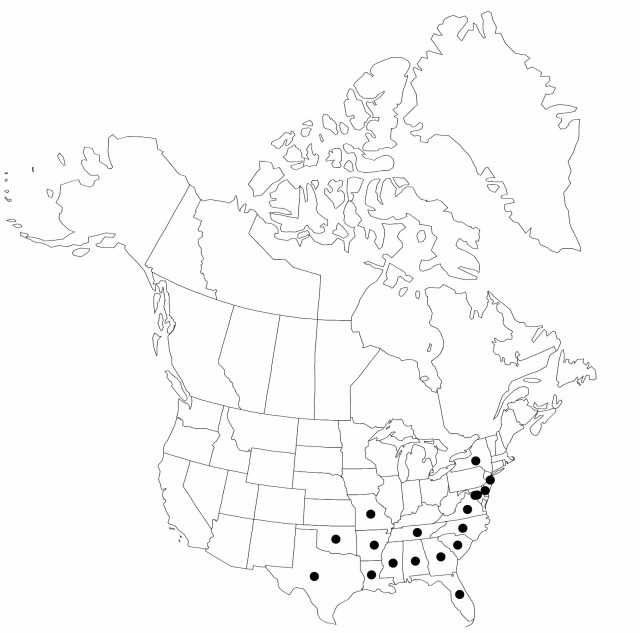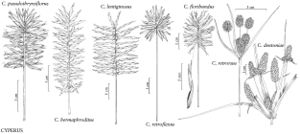Difference between revisions of "Cyperus retrorsus"
Bot. Gaz. 3: 17. 1878.
FNA>Volume Importer |
FNA>Volume Importer |
||
| Line 10: | Line 10: | ||
|name=Mariscus cylindricus | |name=Mariscus cylindricus | ||
|authority=Elliott | |authority=Elliott | ||
| − | }}{{Treatment/ID/Synonym | + | }} {{Treatment/ID/Synonym |
|name=Cyperus cylindricus | |name=Cyperus cylindricus | ||
|authority=(Elliott) Britton | |authority=(Elliott) Britton | ||
| Line 32: | Line 32: | ||
|elevation=0–1000 m | |elevation=0–1000 m | ||
|distribution=Ala.;Ark.;Del.;D.C.;Fla.;Ga.;La.;Md.;Miss.;Mo.;N.J.;N.Y.;N.C.;Okla.;S.C.;Tenn.;Tex.;Va.;Mexico (Tamaulipas). | |distribution=Ala.;Ark.;Del.;D.C.;Fla.;Ga.;La.;Md.;Miss.;Mo.;N.J.;N.Y.;N.C.;Okla.;S.C.;Tenn.;Tex.;Va.;Mexico (Tamaulipas). | ||
| − | |discussion=<p>Cyperus retrorsus was reported in Indiana (M. L. Horvat 1941); we have been unable to confirm the report.</p> | + | |discussion=<p><i>Cyperus retrorsus</i> was reported in Indiana (M. L. Horvat 1941); we have been unable to confirm the report.</p> |
|tables= | |tables= | ||
|references= | |references= | ||
| Line 56: | Line 56: | ||
|publication year=1878 | |publication year=1878 | ||
|special status= | |special status= | ||
| − | |source xml=https://jpend@bitbucket.org/aafc-mbb/fna-data-curation.git/src/ | + | |source xml=https://jpend@bitbucket.org/aafc-mbb/fna-data-curation.git/src/8f726806613d60c220dc4493de13607dd3150896/coarse_grained_fna_xml/V23/V23_323.xml |
|genus=Cyperus | |genus=Cyperus | ||
|subgenus=Cyperus subg. Cyperus | |subgenus=Cyperus subg. Cyperus | ||
Revision as of 16:07, 18 September 2019
Herbs, perennial, cespitose, shortly rhizomatous. Culms trigonous, 20–50(–85) cm × 1–2(–4) mm, glabrous. Leaves 3–6(–10), 10–40(–55) cm × 1.5–4(–5) mm, V- to inversely W-shaped. Inflorescence: spike 1, densely oblong-ovoid often with small basal branches, 8–16 × 4–12(–16) mm; rays 4–8(–11), 0.5–3.5(–8.5) cm; bracts (3–)4–6(–10), ascending at (30–)45°, flat to broadly V-shaped, (4–)14–30(–55) cm × 1–5 mm, scabridulous along margins only; rachilla deciduous, wings persistent, 0.2–0.3 mm wide. Spikelets 40–120, oblong-lanceoloid, subterete, 2.2–4(–4.5) × 0.8–1.6 mm; distal spikelet spreading or ascending; floral scales persistent, 2–5, appressed, brown to stramineous, or fuscous and lustrous, medially greenish and 1(–3)-ribbed, laterally greenish to yellowish white and 3–4-ribbed, oblong to oblong-lanceolate, 1.8–2.5 × 1–1.5 mm, subcoriacous. Flowers: anthers 0.3–0.5 mm; styles 0.5–0.8 mm; stigmas 0.6–0.9 mm. Achenes brown, oblong-ellipsoid, 1.2–1.7 × 0.5–0.6 mm, base cuneate, apex subacute, surfaces papillose.
Phenology: Fruiting summer (Jun–Aug).
Habitat: Open woods and thickets in moist to dry, sandy soils
Elevation: 0–1000 m
Distribution

Ala., Ark., Del., D.C., Fla., Ga., La., Md., Miss., Mo., N.J., N.Y., N.C., Okla., S.C., Tenn., Tex., Va., Mexico (Tamaulipas).
Discussion
Cyperus retrorsus was reported in Indiana (M. L. Horvat 1941); we have been unable to confirm the report.
Selected References
None.
